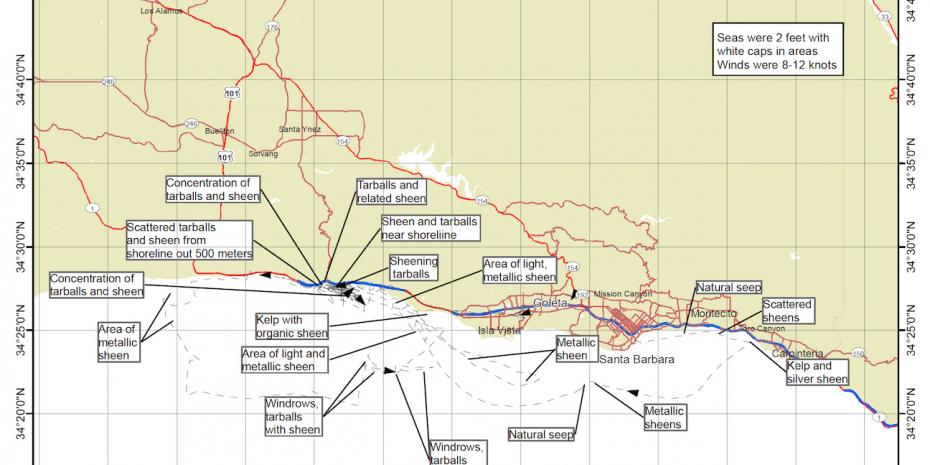An Open Letter To the Citizens Experiencing the Plains All American Pipeline Oil Spill in Santa Barbara

Originally posted on the Louisiana Environmental Action Network on May 27th.
To the Citizens Affected by the Plains All American Pipeline Oil Spill in Santa Barbara,
We the undersigned would like to share with the people of Santa Barbara our concern for those exposing themselves to the crude oil from the oil spill.
Our concerns are based on our personal experiences with the exposure of our fellow citizens and ourselves to crude oil and dispersed crude oil from the BP oil disaster in the Gulf of Mexico in 2010, a tragedy that our communities are still dealing with. Each of us has witnessed the medical problems that have occurred in many clean-up workers and spill responders that we have gotten to know and many more who we will probably never encounter.
Photo: Overflight map prepared by NOAA. Use only as a general reference.
The purpose of this letter is to let you know that exposure to the crude oil on your beaches and coastal waters may have severe medical consequences and the citizens of your community need to be made aware of those facts.
We see daily pictures of citizens wearing sandals, shorts and t-shirts rescuing birds and cleaning beaches. This is an absolutely unacceptable manner of dealing with these materials and needs to be ceased immediately.
Anyone who tells you that these materials are safe and can be handled with minimal care is misrepresenting the facts. Even brief exposure to crude oil can irritate and damage skin, cause headaches, dizziness, nausea, confusion, difficulty breathing and other problems. Inhaling crude oil mist can cause chemical pneumonitis, a serious lung disease.
The key is protection. Clean up workers and volunteers need to wear gloves, eye protection, organic vapor respirators, appropriate foot protection and coveralls if they work with crude oil. AVOID exposure to air, water, mist, dust, sand and other media contaminated with crude oil. Review the OSHA guidance on protective gear and practices.
We would be glad to provide you with additional information on this issue and to speak with representatives of your city on these issues.
The best way that people can help with this incident is to support local environmental organization, Santa Barbara Channelkeeper: http://www.sbck.org
If you fear retaliation for speaking out about workplace protections, contact the Government Accountability Project to discuss your rights:
info [at] whistleblower [dot] org or 202.457.0034, ext. 132
Please see a few additional links that might be helpful to you:
• http://www.sbck.org/action-alerts/
• http://www.refugioresponse.com/
• http://tools.niehs.nih.gov/wetp/index.cfm?id=2495
• https://www.osha.gov/workers/index.html
• http://www.whistleblower.org/GulfTruth
• http://www.sciencecorps.org/crudeoilhazards-workers.pdf
• http://www.sciencecorps.org/crudeoilhazards-public.pdf
We do not want to see your citizens', workers', and volunteers' health harmed in the way we have seen it damaged along our Gulf Coast after the 2010 BP oil disaster. We look forward to continuing this discussion with you. Your health and safety is our concern.
We thank you in advance for reading this and responding.
All our best,
Marylee Orr, Executive Director Louisiana Environmental Action Network
Dr. Michael Robichaux , ENT Physician Raceland, La.
Shanna Devine, Legislative Director,and Investigator Government Accountability Project
Wilma Subra, Subra Company Louisiana Environmental Action Network
Michael Orr, Communications Director Louisiana Environmental Action Network
Paul Orr, Lower Mississippi Riverkeeper
P.S. - For those citizens who insist on taking matters into their own hands:
First, we have to tell you, don’t do it, you are putting your health at risk. Let the professionals take care of it.
Second, we understand, we too felt the need to take action to help wildlife and clean the places we love. If you do choose to respond on your own, please visit a local home improvement warehouse (Lowe’s, Home Depot, or similar) and purchase tyvek coveralls and shoe covers (usually in the paint section), nitrile gloves, eye protection and a half face respirator with organic vapor filters (these are usually in a personal protective equipment section and/or near the paint supplies, sanding supplies, or chemicals). Read all directions, know how to use them properly, and please be careful.
Carefully remove any oil contaminated protective gear and clothing, place in clear trash bags, and make sure they are disposed of properly (bring to official cleanup operations). Do not bring any crude oil contaminated material into your automobile or home.
